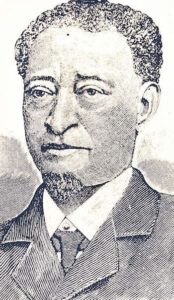
Alexander G. Clark
*Alexander G. Clark was born on this date in 1826. He was a Black laborer, barber, lawyer, and activist.
He was born in Washington County, Pennsylvania, to John Clark, a former slave, and Rebecca Darnes Clark. At 13, he moved to Cincinnati, Ohio, to learn barbering from an uncle who ensured he was well-schooled in other areas. Clark left Cincinnati in October 1841, working for a few months as a bartender on the steamboat George Washington before arriving, at 16, in Muscatine (then called Bloomington, in Iowa Territory). It was May 22, 1842.
As a young man, he saw many opportunities in Iowa and began a barber career in 1868. Clark had other pursuits, as well. He cut and sold wood from timberland he owned along the river bottom to expand his income. He then planted vegetable gardens on the cleared land. On Oct. 9, 1848, Clark married Catherine Griffin of Iowa City, freed from slavery in Virginia at age 3. The Clarks had five children, two of whom died in infancy. In September 1849, at age 23, Clark purchased a house at Third and Chestnut Streets in Muscatine. Thrifty and savvy, Clark had $10,000 in real estate holdings by 1860.
Throughout his life, Clark worked to improve the status of Blacks in Iowa. In 1855, he and 32 other Blacks in Muscatine County petitioned the Iowa Legislature to repeal the law prohibiting "the immigration of free Negroes into this State." The plea was rejected. During the American Civil War, Clark organized the 1st Iowa Black Volunteers (later re-designated the 60th Regiment Infantry, United States Colored Troops), a Union regiment of 1,100 Black soldiers from Iowa and Missouri. Clark himself enlisted in 1863 and was appointed a sergeant major. A disability forced him to focus his energies on soldier recruitment.
Clark is best remembered today for refusing to accept segregated schools. In 1867, he sued when the Muscatine school district said Clark's daughter, Susan, 12, couldn't attend the same public school that white students attended. The Iowa Supreme Court ruled in his favor in 1868, saying all children could attend a standard school. The decision was an important one, preceding by 86 years the landmark 1954 ruling in a Topeka, Kan., case. The U.S. Supreme Court in Brown vs. the Topeka, Kan., Board of Education reversed the "separate but equal" education policy. Clark's lawsuit made Iowa one of the first states to integrate its public school systems. In 1869, a state convention appointed him a delegate to the Colored National Convention in Washington, D.C., where he had the opportunity to meet with President Grant. In 1873, Grant offered Clark an appointment as ambassador to Haiti, but Clark turned down the position because he felt the salary was too small.
His house was destroyed by fire in June 1878, possibly by arson. Clark then built a 2-story, brick double-house on the site. He was denied admission to the University of Iowa's law school because he was Black, and Clark then fought to admit his son, Alexander Jr. In 1879, Alexander Jr. became the first Black to graduate from that school. The senior Clark became the second Black U. of Iowa law graduate in 1884, graduating eighth in a class of 80. Later, father and son practiced in Iowa and Illinois. While attending Law School (1882), Clark purchased the Chicago Conservator newspaper and ran it successfully as publisher and editor until 1887, when he sold it.
Active in both the Masonic Lodge and the Republican Party, Clark traveled extensively for both, and his speaking skills won praise and earned him the title "Colored Orator of the West." Clark's final achievement came when President Harrison appointed him U.S. minister to Liberia on Aug. 16, 1890. One of the most influential men of his time, Clark arguably did more for racial justice than anyone else in 19th-century Iowa. Alexander Clark died in Monrovia, Liberia, on June 3, 1891. He was buried with honors at Muscatine's Greenwood Cemetery on Feb. 16, 1892.
Bloomington Journal; Muscatine Evening Journal; Muscatine Weekly Journal.
Court Decisions - Muscatine County Court House, Supreme Court, Des Moines. National Archives Records, Washington, D.C.
Walton's Scrapbook, Laura Musser Art Gallery and Museum.
Gallaher, Ruth A. "A Colored Convention," Palimpsest. Vol. II. State Historical Society of Iowa, May 1921. Iowa City, Iowa. pp. 178-81.
Randall, J.J. Little Known Stories of Muscatine. Fairall Service. l949. Muscatine, Iowa.
Simmons, Rev. William J., D.D., Men of Mark - Eminent, Progressive and Rising. First published 1887. Reprinted by Arno Press and N.Y. Times. N.Y. 1968.
Witter, F.M., Walton, Alice B., Walton, J.P., History of Muscatine County. Western Historical Society, 1879. Chicago. pp. 597-598.